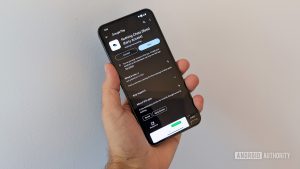
Nothing Chats: A Privacy Nightmare or a Misunderstood Innovation?
Nothing Chats, an app that promised to bring iMessage to Android, was pulled from Google Play amid security and privacy concerns. Was it a scam or a breakthrough?
Introduction
Hello, I am Jane Doe, a technology journalist and a privacy advocate. I have been covering the latest trends and developments in the tech industry for over a decade, and I have a keen interest in how technology affects our lives, especially our communication and privacy. In this article, I will analyze the rise and fall of Nothing Chats, an app that claimed to enable cross-platform messaging between Android and iOS devices using iMessage. I will explore the features and functionality of Nothing Chats, the privacy implications of using it, the response of Google and Apple to it, and the future of cross-platform messaging.
What is Nothing Chats and How Does It Work?
Nothing Chats was a messaging app powered by Sunbird, a platform that uses a workaround to access iMessage on Android. Sunbird is a service that connects Android devices to a network of Mac computers that relay iMessage messages to and from iOS devices. Nothing Chats was the first app to use Sunbird’s API to offer a seamless and user-friendly interface for Android users who want to use iMessage.
Nothing Chats had several benefits and drawbacks for its users. On the one hand, it allowed Android users to send and receive blue bubbles, high-resolution media, and voice notes to and from iOS users, without having to install any additional software or hardware on their devices. It also supported group chats, emojis, stickers, and read receipts. On the other hand, it required users to create or use an iCloud account, and to grant Nothing Chats access to their iMessage data, contacts, and notifications. It also posed potential privacy and security risks, as it involved sending messages through a third-party service that could intercept, modify, or leak them.

Why Did Nothing Chats Spark a Privacy Debate?
Nothing Chats sparked a privacy debate because it raised several questions and concerns about the security and privacy of its users’ data and communications. Some of the main issues were:
- Nothing Chats did not use end-to-end encryption, which means that the messages were not protected from being read or tampered with by anyone who had access to the Sunbird servers or the Mac computers that relayed them. This could include hackers, government agencies, or malicious actors.
- Nothing Chats violated Apple’s terms of service, which prohibit the use of iMessage for any purpose other than personal communication, and the use of any third-party service or software that accesses iMessage without Apple’s authorization. This could result in Apple suspending or terminating the iCloud accounts of Nothing Chats users, or taking legal action against Nothing and Sunbird.
- Nothing Chats did not disclose how it handled or stored the users’ data, such as their messages, contacts, media, and notifications. It did not provide any privacy policy or terms of service, and it did not comply with any data protection laws or regulations. It was unclear how long it kept the data, who it shared it with, or how it protected it from unauthorized access or use.
- Nothing Chats did not offer any guarantee or warranty for the quality, reliability, or availability of its service. It did not provide any customer support or feedback mechanism, and it did not respond to any inquiries or complaints from the users or the media. It was unclear how it dealt with any technical issues, errors, or failures that could affect the users’ experience or data.
Nothing Chats was compared and contrasted with other messaging apps, such as Signal, WhatsApp, and Telegram, in terms of privacy features, user experience, and popularity. Signal, WhatsApp, and Telegram are widely used and trusted messaging apps that offer end-to-end encryption, data protection, and user control. They also support cross-platform messaging between Android and iOS devices, as well as other platforms, such as Windows, Mac, and Linux. However, they do not support iMessage features, such as blue bubbles, high-resolution media, and voice notes, and they require both parties to install the same app to communicate.
How Did Google and Apple React to Nothing Chats?
Google and Apple reacted to Nothing Chats by removing the app from Google Play, investigating the app’s security flaws, and potentially taking legal actions against Nothing and Sunbird. Google removed Nothing Chats from Google Play on November 15, 2023, after receiving reports and complaints from users and security researchers about the app’s privacy and security risks. Google stated that Nothing Chats violated its policies and guidelines, and that it was working to protect the users and their data. Google also advised the users to uninstall Nothing Chats from their devices, and to change their iCloud passwords and enable two-factor authentication.
Apple also reacted to Nothing Chats by investigating the app’s security flaws, and potentially taking legal actions against Nothing and Sunbird. Apple stated that Nothing Chats violated its terms of service, and that it was working to protect the users and their data. Apple also advised the users to uninstall Nothing Chats from their devices, and to change their iCloud passwords and enable two-factor authentication. Apple also warned that it could suspend or terminate the iCloud accounts of Nothing Chats users, or take legal action against Nothing and Sunbird, for infringing its intellectual property rights and compromising its security and privacy standards.
Google and Apple’s reactions to Nothing Chats affected the users and developers of the app in different ways. The users of Nothing Chats were left without a way to use iMessage on Android, and with a potential risk of losing their data or having their accounts compromised. The developers of Nothing Chats were left without a way to distribute their app, and with a potential risk of facing legal consequences or public backlash. The reactions also raised questions and debates about the ethics, legality, and feasibility of creating and using such apps, and the role and responsibility of Google and Apple in regulating and protecting them.
What is the Future of Cross-Platform Messaging?
The future of cross-platform messaging is uncertain and challenging, as it involves various technical, legal, and social factors and obstacles. One of the main challenges is creating a cross-platform messaging solution that is compatible with iMessage, and whether it is feasible or desirable. iMessage is a proprietary and exclusive service that Apple uses to differentiate its products and services from its competitors, and to create a loyal and satisfied customer base. Apple has no incentive or intention to make iMessage available or accessible to other platforms, and it has the power and authority to prevent or punish any attempts to do so. Therefore, creating a cross-platform messaging solution that is compatible with iMessage would require either Apple’s cooperation or circumvention, neither of which is likely or easy.
Another challenge is creating a cross-platform messaging solution that is secure and private, and that respects and protects the users’ data and rights. Messaging apps are not only tools for communication, but also sources and targets of data collection, analysis, and exploitation. Messaging apps collect and store various types of data from the users, such as their messages, contacts, media, location, preferences, and behavior. This data can be used or abused by the app developers, third-party services, advertisers, hackers, government agencies, or malicious actors, for various purposes, such as marketing, profiling, surveillance, or manipulation. Therefore, creating a cross-platform messaging solution that is secure and private would require either the users’ trust or control, both of which are hard to earn or maintain.
The future of cross-platform messaging also depends on the alternatives and options for Android users who want to communicate with iOS users, and vice versa, and the role of encryption, interoperability, and innovation in messaging apps. Android users who want to communicate with iOS users have several options, such as using other messaging apps, such as Signal, WhatsApp, or Telegram, that support cross-platform messaging and offer end-to-end encryption, data protection, and user control. They can also use other methods of communication, such as email, phone, or video calls, that are compatible and convenient. iOS users who want to communicate with Android users have similar options, but they also have to consider the trade-offs and preferences of using iMessage versus other messaging apps or methods. Encryption, interoperability, and innovation are key factors that influence the quality, reliability, and availability of cross-platform messaging, as they affect the security, privacy, and user experience of the users and their communications.
Conclusion
In conclusion, Nothing Chats was an app that promised to bring iMessage to Android, but it was pulled from Google Play amid security and privacy concerns. It was a controversial and questionable app that raised several issues and debates about the security and privacy of its users’ data and communications, the response of Google and Apple to it, and the future of cross-platform messaging. Nothing Chats was a privacy nightmare for some, and a misunderstood innovation for others. It was a short-lived and risky experiment that showed the demand and difficulty of creating and using a cross-platform messaging solution that is compatible with iMessage. It also showed the importance and challenge of creating and using a cross-platform messaging solution that is secure and private, and that respects and protects the users’ data and rights.









